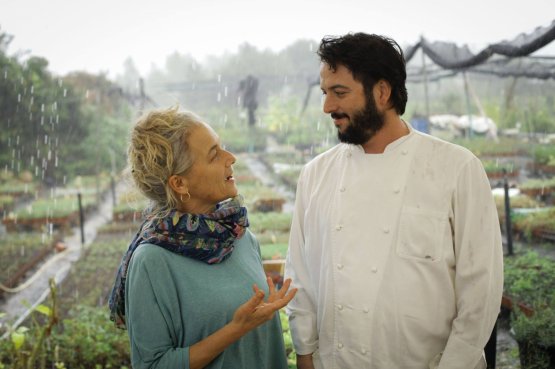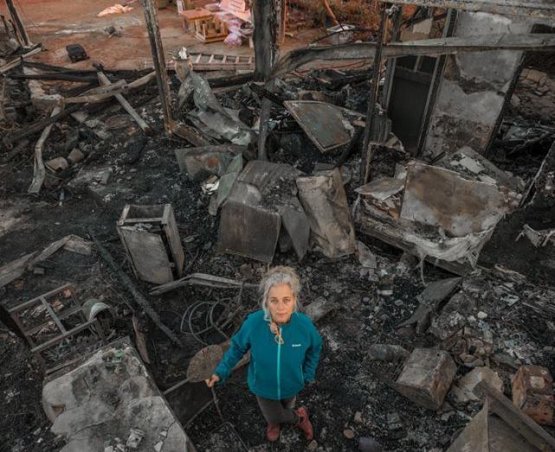Our collaborator Fabiana Magrì calls from Tel Aviv: «They have set fire to Rama’s. There have been many malicious fires in that area, they say it could be a new form of terrorism», or intifada if you wish. But when? How? Readers might also wonder where? To what? So a premise is necessary: Rama’s Kitchen, in Nataf, less than 20 km to the north-east of Jerusalem is the restaurant where chef Tomer Niv, a sort of Israeli Heston Blumenthal, after all he also worked at Fat Duck (and The Ledbury, and Noma) has been working since 2008. Here he reapplied the former’s ideas, but on the hills of Judea: a twice-interesting project.
We met him two weeks ago in Milan. He told us of his work recuperating the ancient recipes of the region, «some date back to 1,400 years ago». A way to give a historical element to the modern local cuisine which has a thousand different influences given in the last few decades by all the countries around the world, by those returning after the diaspora.

Rama Ben Zvi, patron at Rama's Kitchen, with chef Tomer Niv
’s work is inclusive, hardly “nationalistic” – speaking of politics – in that it uses ancient texts to recuperate culinary specialties of this area, populated, dominated or influenced by different people over time: «There’s a strong presence of Turkish and Arab tradition. But then we have dishes specifically inspired by Syria and Palestine, Lebanon and Persia... I’m trying to represent a whole stratification through the centuries, having local products and history meet a very technical, emotional, science based style».
The resulting recipes have clean and very intense flavours, with a strong use of acidity, spiciness, bitterness: «Let’s remember there were no tomatoes. Nor potatoes», Niv sums up, meaning that it was missing the kind of ingredient that can soften and please the palate. In this case instead it is strongly stimulated, «for instance I use a pomegranate reduction to contrast the lamb fat». And then contemporary logic: «All the fruit and vegetables are organic, we either grow them personally or buy them from nearby farmers while the herbs grow in our vegetable garden (run by Uzi, Rama’s husband – she’s the patron after whom the restaurant is named) surrounding the restaurant and part of a nearby hill, where many edible species thrive. Harvest is part of our daily routine».
Israel is now a chest of flavours (we wrote about it
here and
here, and
here too) that come from different cultures, «and
Tomer’s cooking is the perfect representation of this: past and future, ancient and modern, tradition and innovation. Just like Israel these days, except perhaps Tel Aviv, which is the most western of our cities», told us the director of the Israeli Tourism Organisation in Italy,
Avital Kotzel Adari, during the same meeting. «True, we’re an incredible mosaic»
Tomer confirms. He’s also a delegate of
Terra Madre and is a committed promoter of sustainable fishing in the Mediterranean sea, «I live in the port of Jaffa. Many Jews come from countries where they used to eat herrings or salmon, we make them discover local seafood».
Not these ideas, but everything else was burnt. The surroundings had been affected by fires for days. The final episode on Friday. «It was very simple – owner Rama Ben Zvi, shaking her head, told the Times of Israel – A guy threw a firebomb on the other side of the fence, and one hour later there was no more restaurant». Destroyed in ten minutes. Nataf overlooks a group of Palestinian villages on the West Bank, less than 5 km away. But there’s no official confirmation to Rama’s reconstruction. Responsibilities must still be clarified.
The restaurant was hosting a wedding when it was evacuated. Something that had already happened in the village, «the first fire was on Wednesday – says Ben Zvi – when some Arab workers were preparing coffee under a tree and their machine accidentally caused a fire that quickly spread and burnt a house». So at least the beginning was accidental.

Rama Ben Zvi among the ruins of her restaurant
Nothing to worry about. On Thursday things had gone back to normal. Then a new alarm on Friday: guests at a wedding at
Rama’s had just finished dessert when the fire brigade was back and fire-fighting airplanes were flying above. The wind changed, «so strong, from the East. The fire changed direction and started to move closer to the restaurant. I saw a big flame approaching and I knew it was the end of
Rama’s Kitchen». Some Palestinians in the restaurant’s staff and some neighbours saved the home of the
Ben Zvi somehow, a stone’s throw away from the restaurant. Here only the brick oven for bread baking can still be used. Everything else is a carbonised hull, and what is not burnt is covered in a thin layer of dust, the one used by the fire brigade.
Rama received a phone call from Israeli premier Benjamin Netanyahu: «He called to offer his condolences and to reassure the State will reimburse damages as this was a terrorist attack. You know, I’m not that kind of person. But Bibi told me they’ll be very quick». The desire to start again is strong: Rama and her husband have been living in Nataf for 25 years, and opened Rama’s Kitchen 21 years ago.